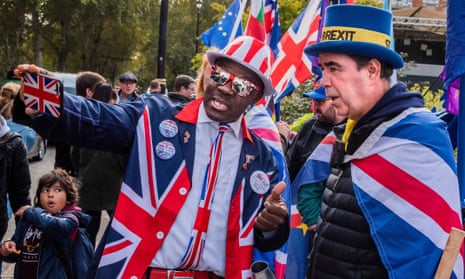People are divided more deeply by identity than by issues, according to a survey that suggests culture wars are fuelled mostly by partisanship and that voters have more in common than many think.
The YouGov-Cambridge Globalism Project found that in particularly polarised countries including the US and UK, political clans that profess mutual loathing often align on the substance of debates, even in highly charged areas such as sexism and racism.
The findings confirm a growing phenomenon known as affective polarisation – a “them versus us” mentality that places animosity towards political opponents above almost all other considerations – that is alarming political scientists.
Experts have argued that the phenomenon can eventually lead voters to support corrupt politicians who violate democratic norms, simply because they believe it preferable to the opposition winning an election.
Political scientists and psychologists also fear that affective polarisation, ably exploited by some politicians to maximise differences and motivate their voters, can make political compromise impossible.
The annual survey of more than 27,000 people in 27 countries began by asking respondents how they felt about various political affiliations and labels. The results revealed voters fractured into bitterly opposed camps.
In the UK, 88% of Labour voters said they disliked Conservative politicians and 73% said they disliked Conservative supporters. Similarly, 74% of Tory supporters said they disliked Labour politicians and 45% disliked Labour voters.
Hostility was even stronger in the US, where 93% of Trump supporters said they disliked Democratic politicians and 90% of Biden voters said the same of Republican politicians. Antipathy towards the other camp’s voters was at similar levels.
The survey found the same divides around defining culture war labels: asked if they considered themselves a feminist, for example, 64% of Conservative voters in the UK and 85% of Trump supporters in the US said no, while 53% of Labour supporters and 58% of Biden voters said yes.
But when asked about their attitudes to some of the issues underlying the label “feminist”, people appeared considerably less polarised. One question asked whether three jobs – cleaner, nurse and politician – were more suited to women or men, or equally suited to all genders.
Large majorities – generally between 75% and 90% – of both Conservative and Labour voters in the UK, and of Trump and Biden supporters in the US, responded that they considered all three jobs were equally suited to all genders.
The survey also found majorities in both tribes in the US and UK felt it was unacceptable for a man to “whistle in the street at a woman he does not know” and that “promoting equality for women” should be a priority for society. Only small percentages disagreed.
The phenomenon was replicated in other countries. In France, 69% of supporters of President Emmanuel Macron (69%) and 55% of backers of the far-right leader Marine Le Pen expressed dislike for each other, but many held overlapping views on equality for women, with 80% of Macron voters and 71% of Le Pen voters saying it should be a high or medium priority.
The pattern was broadly the same among supporters of Germany’s Green party and Alternative für Deutschland, the ruling national-conservative Law & Justice (PiS) party and the Left in Poland, the far-right Vox party and leftwing Podemos in Spain, and New Democracy and Syriza in Greece.
Other hot-button topics showed the same picture in the US, UK and elsewhere. Clear majorities of Labour (66%) and Biden (72%) supporters declared themselves very or fairly favourable towards the anti-racism organisation Black Lives Matter, with while only 5% of Trump supporters and 17% of Tory voters shared the same opinion.
But when asked how important “combating racisms of all kinds” should be for their country, clear majorities of Conservative (80%), Labour (94%) and Biden (92%) voters said it should be a high or medium priority, along with 47% of Trump voters.
In the UK, attitudes towards Extinction Rebellion were a similarly poor reflection of people’s feelings about the underlying issue of climate change. About 63% of Conservative voters and 23% of Labour voters expressed an unfavourable view of about the environmental campaign group.
Majorities in both camps, however, shared broadly the same views on substantive environmental issues, with 72% of Tory supporters and 90% of Labour supporters saying that “moving away from carbon-intensive industries towards greener alternatives” should be a high or medium priority for their country.
“None of this is to say that significant divides do not exist in political and social attitudes,” said the authors of the survey, carried out in August and September, adding that the findings supported the emerging theory that people are more influenced by identity than issues.
“The point is that when we compare people by their attitudes to specifics of issues, rather than by markers of identity, we find [most] are not cleaved into separate, polarised clusters, or ranged against each other with clashing visions.”
The authors identified two other notable findings: in several countries, supporters of leftwing parties were more likely to be antipathetic towards supporters of rightwing parties than the reverse; and in the UK, Brexit remains a more significant marker of political identity than party affiliation.
In the US, 86% of Biden supporters said they disliked Trump voters, compared with 73% the other way round. The pattern also held in France for Macron and Le Pen voters (69% v 55%), in Poland for the Left and PiS (85% v 48%), and in Greece for Syriza and New Democracy (70% v 60%).
In the UK, only half of Tory and Liberal Democrat voters, and 64% of Labour voters, said they felt a common sense of identity with people who voted with them in the 2019 general election. Asked how strongly they identified with those who voted the same way in the referendum, the figure was 80% for remainers and 72% for leavers.
